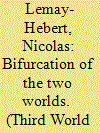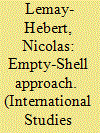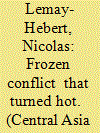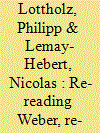| Srl | Item |
| 1 |
ID:
108115


|
|
|
|
|
| Publication |
2011.
|
| Summary/Abstract |
Studies increasingly highlight the limits of state building conducted 'from the top-down'. Building on the literature and using a Rosenauian concept in a novel way, this article posits that international interventions create a 'bifurcation of the two worlds'. Departing from a study of Kosovo and Timor-Leste, the article posits that the massive arrival of staff involved in international governance will create a social gap between the international and the local 'worlds', which will in turn become a target of narratives of resistance by local actors. This bifurcation is exemplified by the 'white car syndrome', a concept representing the horde of white UN vehicles accompanying major interventions and developed in this contribution. Thus, the article attempts to shed new light on the legitimacy crises that Kosovo and Timor-Leste experienced at the beginning of the current century, while demonstrating and increasing the linkages between development studies and peace studies.
|
|
|
|
|
|
|
|
|
|
|
|
|
|
|
|
| 2 |
ID:
105238


|
|
|
|
|
| Publication |
2011.
|
| Summary/Abstract |
State-building under the aegis of international administrations has faced various hurdles and obstacles in Kosovo and Timor-Leste-failures that came to full light in March 2004 in Kosovo and in May 2006 in Timor-Leste. However, the international conception buttressing the set up of international administrations-I dub it the "empty-shell" approach-is still present in certain policy circles. This article aims to analyze this international conception by clarifying how the UN came to impose its authority over the two territories in a very similar process. While the literature on each state-building experiment is vast and compelling, few authors have attempted to contrast the two case studies, especially regarding the mental conception informing the governance process of these territories since 1999. This article links the empty-shell approach with the delegitimization process that came to be experienced by the UN in both cases. The article describes the international policies put in place by the UN to expand its control over the two territories, a mix of co-option of local elites and the marginalization of the local population. Finally, the article reveals some possible solutions in order to avoid the more blatant difficulties pertaining to state-building conducted from the outside-in.
|
|
|
|
|
|
|
|
|
|
|
|
|
|
|
|
| 3 |
ID:
084976


|
|
|
| 4 |
ID:
153894


|
|
|
|
|
| Summary/Abstract |
This article analyzes how different interpretations of Max Weber’s work on the state and legitimacy have materialized in contemporary research on—and practice of—international state-building. We argue that the currently prevailing neo-Weberian institutionalism in state-building theory and practice is based on a selective interpretation of the passionate and polemicist ‘politician’ Max Weber, whilst omitting almost entirely the wealth of thought on interpretivist method and the anti-foundationalist approach to social sciences that he has developed in his scholarly work. The neo-Weberian institutionalist approach thus focuses almost exclusively on state capacity and institutions. In contrast to this restricted approach, we will show how Weber’s work on the historical and cultural dimensions of legitimacy is instructive in understanding the emergence and consolidation of social orders. Research agendas embracing such perspectives offer a viable way forward from the securitized approach to state-building and international intervention, in the process moving beyond the neo-Weberian orthodoxy.
|
|
|
|
|
|
|
|
|
|
|
|
|
|
|
|